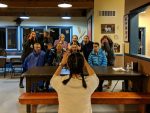Sea to Sky Aphasia Camp provides a three-day retreat to 30 campers and their family members at Zajac Ranch in Mission, B.C. (photo from Sea to Sky)
Aphasia is a communication impairment most often caused by stroke, but it can also be due to any brain injury. It impacts a person’s ability to speak, understand spoken language, and the ability to read and to write.
“It’s important to understand that, while communication is impaired, a person’s cognitive function is not,” said Eavan Sinden, a speech-language pathologist at the University of British Columbia, about the condition. “This is something Sea to Sky [Aphasia] Camp focuses on – that we can create a communicably accessible and supportive environment, while acknowledging the inherent competence.
“But, there are some prominent researchers in the world of aphasia now who are looking at expanding on [the] definition … so that it would include the impact of aphasia on a person’s life – the impact it has on a person’s identity, on a person’s ability to participate in social events, their ability to work, their ability to be in the role that we assume … mom, dad, daughter, whatever … changing the definition a little bit to include that impact.”
Out of the 100,000 people in Canada who will suffer a stroke this year, 35% of stroke survivors will live with some form of aphasia. Further to that, 62% of these survivors will experience depression after the stroke.
Sinden teaches and does research at UBC’s School of Audiology and Speech Sciences. One of her primary roles within the school is to coordinate the Sea to Sky camp every September. This fall, it will run Sept. 20-22.
The camp, which is entering its 10th year, provides a three-day retreat to 30 campers and their family members at Zajac Ranch in Mission, B.C., in a facility specifically designed for people with unique abilities and challenges.
To make the camp a reality, Sinden and UBC partner with Douglas College’s therapeutic recreation program, and March of Dimes Canada. “There’s a lot of support for this camp,” Sinden told the Independent. “In addition to being a camp for people with aphasia, those 30 campers come with family or friends, if they choose.
“We also have 36 healthcare-professional students who come for the weekend to learn a little bit more about what it’s like to live with a chronic impairment, such as aphasia. They are speech-language pathology students, audiology students, therapeutic-recreation students, nursing, pharmacy, dental hygiene and physiotherapy – a whole range of care students who opt, every year, to do this. Without them, we wouldn’t have enough support. It’s really great to have these layers of partnerships in the community. They really help create that communicably accessible environment.”
There is also a group of clinical leads, healthcare professionals in the community, who have been working with aphasia and who volunteer the weekend of the camp to work with the students.
A disturbing trend, according to Sinden, is that aphasia is affecting younger and younger people. “This is the frightening part,” she said. “We have people anywhere from 30 or 31 to their late 70s or early 80s, a real range, but the majority are in their 50s and 60s. It’s no longer something you’d think just happens to older people. The Heart and Stroke Foundation has written quite a few reports on that.”
At Sea to Sky, participants can do yoga, horseback riding, cooking, singing, dancing, campfires, basketball, swimming, arts and woodwork.
“A lot of our activities are run by people with aphasia, as well, who have come to the camp for many years and are now leaders in that way,” said Sinden. “The students also take a role in working on some of those activities.”
All accommodations and meals are included in the $250 cost for the weekend.
“It’s a really terrific way for people with aphasia in the community to come together, socialize and be with people who’ve been on similar journeys,” said Sinden. “Aphasia can be very isolating, so it can be incredibly powerful to meet people with whom you have a shared experience, who you can see that idea of, ‘OK, I can do this.’ Maybe, if I’m a little earlier on in my recovery and I see someone 10 years post doing something that I didn’t think would be possible … that can open up opportunities.
“We have a great core group who come year after year,” she added. “But, I have to say, especially this year, we had quite a number of newcomers, which is exciting. We’re always trying to extend our reach and support the community of people with aphasia.”
While the number of people suffering from aphasia has increased, the camp has been able to accommodate the demand – but just barely, due to space and funding.
“We’re fortunate in that March of Dimes, UBC and Douglas College support us with grants, but every year we hope to still get the funds,” said Sinden. “It’s never a sure thing. There’s a huge need for more community support. If we could take more campers or run more camps, we would also be happy to do that and it’s something on our wish list.”
This year, Sinden is starting a campaign called Sponsor a Camper, asking donors to give $250 so someone can attend the camp. Other support is raised via the Stroke Recovery Association of British Columbia and Fraser Health.
For more information, visit srabc.ca or aphasia.ca.
Rebeca Kuropatwa is a Winnipeg freelance writer.

